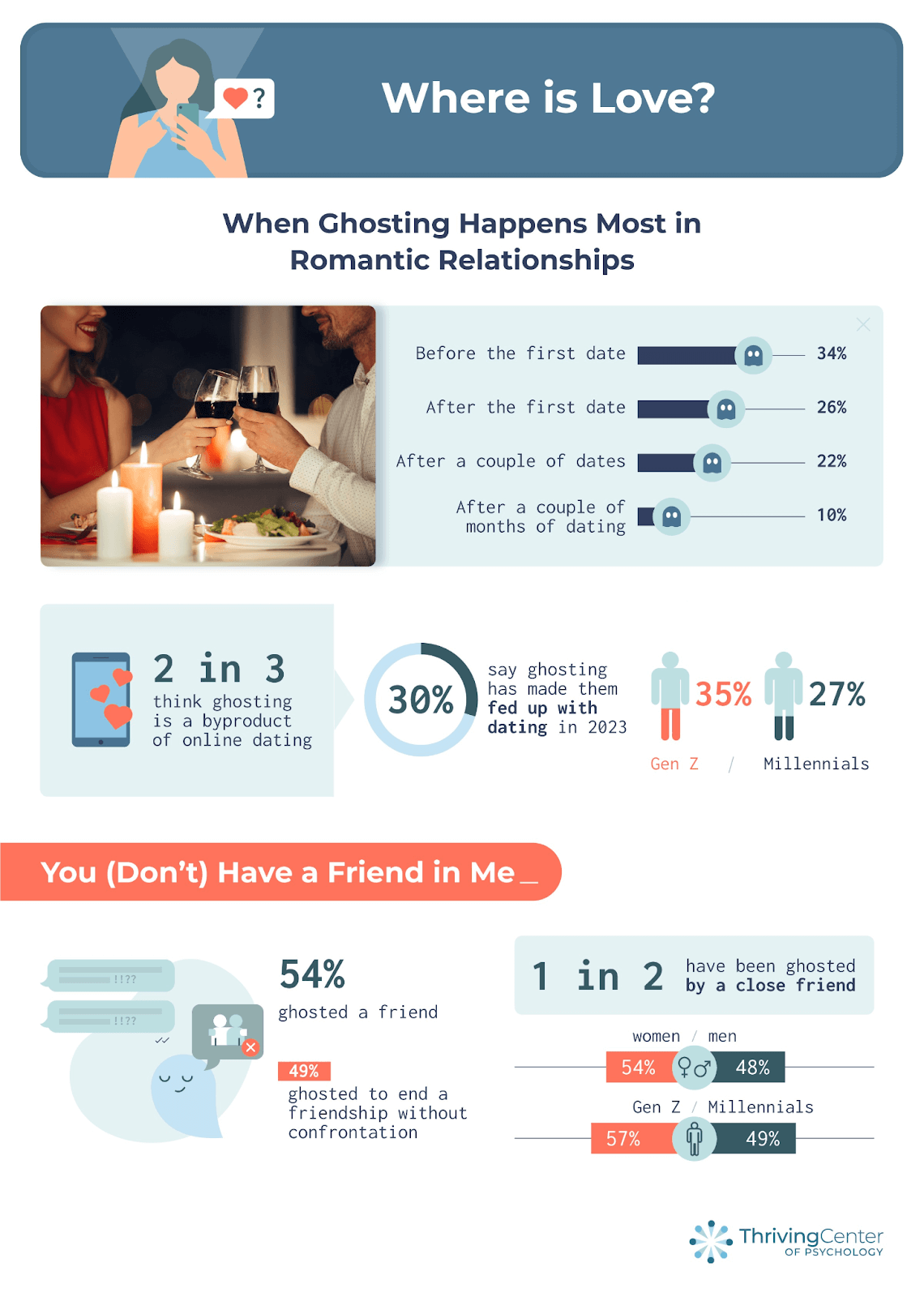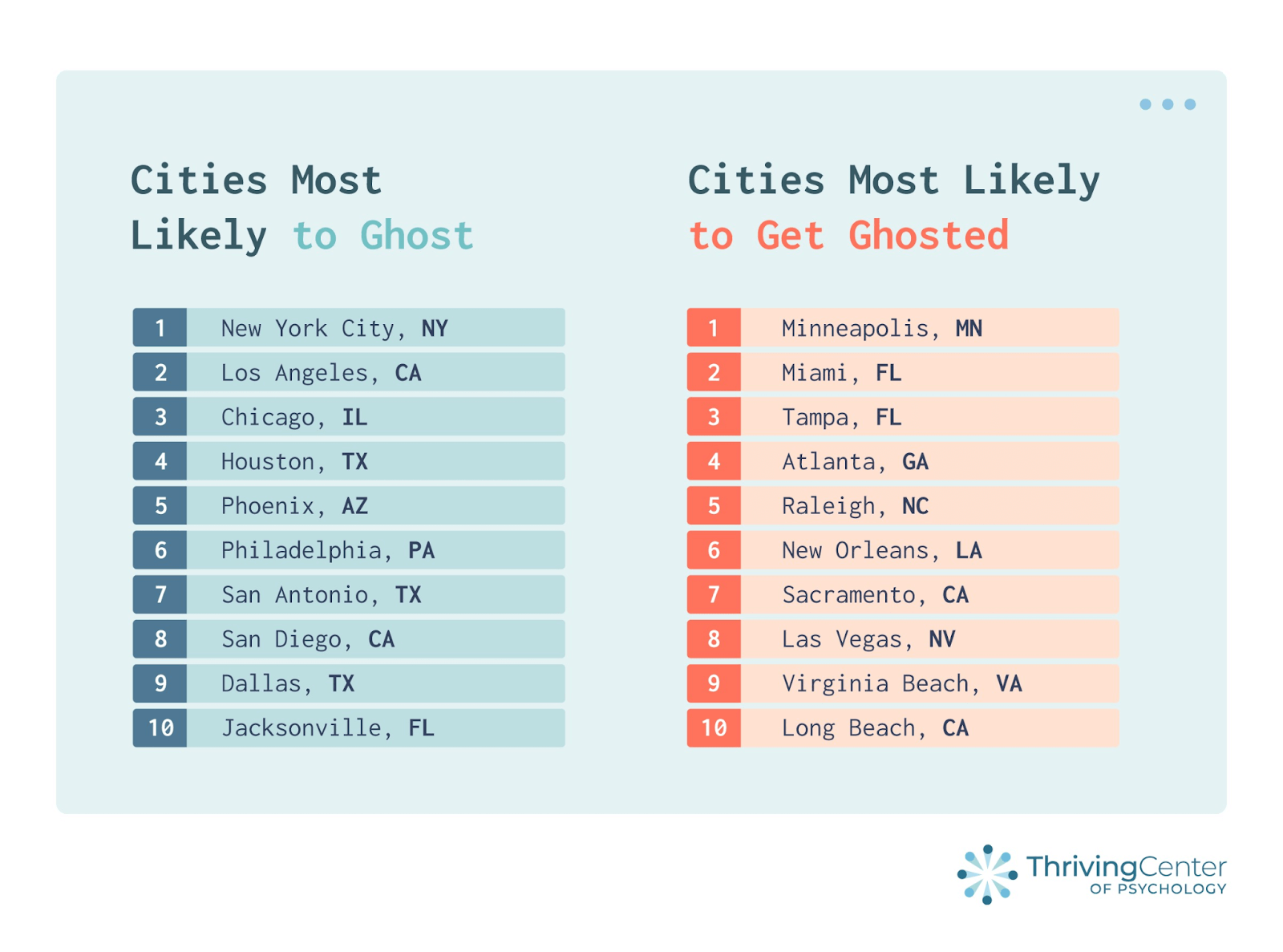NEW YORK — Halloween may be over, but ghosting is still as popular as ever. The impolite practice of suddenly cutting off all contact with someone has become a common tactic — especially among younger adults. Now, a new survey finds a staggering 84 percent of Gen Z and millennials have been ghosted by someone. In a sign of the times, however, three-quarters of young adults still think it’s acceptable to ghost others, regardless of the emotional impact it can have.
Furthermore, nearly two-thirds admit to having ghosted someone themselves, a practice now being referred to as “reciprocal ghosting.”
“The high rate of reciprocal ghosting may be due to a cyclical emotional pattern,” says licensed clinical psychologist Dr. Alexander Alvarado in a statement. “Once people experience the discomfort of being ghosted, they might unconsciously adopt the same behavior as a self-defense mechanism, thinking that it’s better to disengage first than risk emotional harm.”
According to the poll by the Thriving Center of Psychology, Gen Zers and women were more likely to ghost others compared to millennials and men, respectively. The main reasons cited for ghosting include a lack of interest in continuing the relationship (64%), a desire to avoid confrontation (56%), or feeling overwhelmed by the expectations of the relationship (44%). Mental health struggles are also a significant factor, with nearly one-third of respondents attributing their ghosting behavior to these issues.
No regrets about ghosting?
Contrary to what one might expect, the aftermath of ghosting often brings a sense of relief rather than regret, with 86 percent of all people — and a whopping 91 percent of women — reporting that it was a weight off their shoulders after ghosting someone. Regret and guilt are less commonly felt, with fewer than half experiencing remorse for their actions.
Ghosting is notoriously prevalent in the dating scene, with two-thirds blaming the creation of online dating for the practice’s popularity. Many report being ghosted before ever meeting their date in person (34%), while others experienced it after several dates (22%) or even months into their relationship (10%). This trend has led to three in 10 singles expressing frustration with the dating scene in 2023.
However, ghosting can extend beyond romantic encounters. An astonishing 50 percent have experienced ghosting within friendships, particularly among Gen Z individuals and women. The leading cause for ghosting a friend is to dodge confrontation and the associated conflicts.

Can you really ghost your boss?
Do you really have to give two weeks’ notice if you’re quitting a job? Apparently not. One in four workers has ghosted their workplace by resigning without prior notice or explanation.
Conversely, if you think it’s strange for companies to completely ignore you after applying for an open job, it’s not. Over 40 percent have been ghosted by a potential employer, often during the interview stage.
So, where can you go to avoid ghosting?
While ghosting really comes down to the behavior of the person you’re interacting with, there are a number of places across the United States where ghosting runs rampant. An analysis of Google searches in the country’s most populous cities revealed that those with the most queries about ghosting, like Minneapolis, Miami, and Tampa, are most likely to experience it. Conversely, cities like New York, Los Angeles, and Chicago, where searches are fewer, are hotspots for individuals more likely to ghost others.
“Instead of ghosting, I recommend open communication,” says Alvarado. “If you’re no longer interested in continuing a relationship, it’s respectful to inform the other person directly. While this might be uncomfortable, it allows both parties to have closure and to move on without lingering questions.”

Survey methodology:
In August 2023, the Thriving Center of Psychology surveyed 1,014 Gen Z and Millennials about the act of ghosting and how it’s impacted their lives. Respondents ranged in age from 18 to 42, with an average age of 32. 49% were male, 49% were female, and 2% were non-binary. 75% of respondents identified as heterosexual, 17% as bisexual, 3% as gay, 2% as lesbian, and 3% as other.
For this report, researchers also analyzed Google search volume of 418 terms related to ghosting, such as “Why do men ghost you,” “What does ghosting people mean,” and “Am I being ghosted” over the period from July 2020 to July 2023. They analyzed the 50 most populous cities in the United States according to the U.S. Census Bureau. The cities most likely to ghost people were the ones searching the least for these terms and the cities most likely to get ghosted were the ones searching for these terms the most.

